Lifestyle choices, regular screenings may lower cancer risks
A cancer diagnosis can be scary, and for some people, a diagnosis that may be prevented.
As the nation observes National Cancer Prevention Month in February, University of Mississippi Medical Center physicians in the UMMC Cancer Center and Research Institute are urging people to take steps to lower risk factors that may help prevent cancer and to be screened regularly.
Teaching prevention is one prime focus of researchers, too.
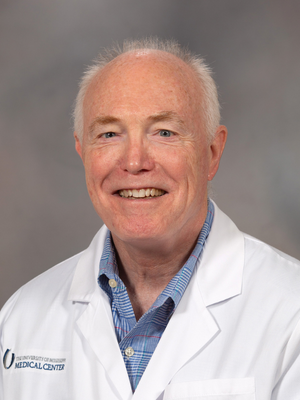
“We always think of regulating cancer with medications and treatment,” said Dr. Michael Stefanek, who heads the UMMC CCRI Cancer Control, Epidemiology and Disparities Program. He said lowering risk factors can affect almost half of all cancers.
“The idea of getting people to stop smoking, manage their weight, exercise, eat sensibly and get screened can make a huge difference in cancer mortality and cancer incidence,” Stefanek said.
What can you do?
Stop using tobacco
UMMC CCRI experts say smoking and other types of tobacco use are a risk factor in more than 30 cancers and can make treatment for other diseases less effective. It’s a prime risk factor in two cancer types: lung cancer and head and neck cancers.
In fact, smoking is estimated to cause 80-90 percent of all lung cancer deaths.
It goes beyond cancer: Tobacco use increases a person’s risk of multiple lung diseases and heart diseases and impedes the body’s effort to heal after injury or surgery.
Members of the UMMC CCRI Interdisciplinary Thoracic Cancer Program also recommend longtime heavy smokers should talk to their doctors about being screened. Low Dose Computed Tomography screening can identify many lung cancers while they’re small and more easily treatable.
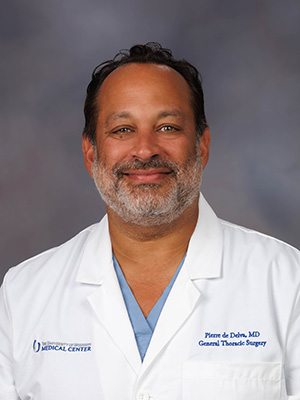
Members of the UMMC CCRI Head and Neck team strongly recommend oral cancer screenings, often a routine part of a dental visit. Head and neck cancer patients who smoke also have an increased risk of lung cancer due to their smoking.
“I would be happy if everyone quit smoking,” said Dr. Pierre de Delva, who heads the UMMC CCRI Thoracic Program. Quitting smoking lowers a person’s risk of having lung cancer; for those who have it, quitting smoking increases the chance of survival.
“We know cancer treatment is more effective if people quit smoking and we also know that if they quit, they lower their risks of stroke and heart attack,” de Delva said. “It’s simple: Quit using tobacco.”
Current smokers or those who have quit within the last 15 years and are between the ages of 55-77 are eligible for LDCT screening. For assistance, contact the ACT Center for Tobacco Treatment, Education and Research, UMMC’s tobacco cessation program, for help.
Get the human papillomavirus vaccine
The human papillomavirus vaccine can help prevent HPV strains that cause many cervical cancers and some head and neck cancers. UMMC CCRI experts recommend it for everyone through age 26. The vaccine can prevent new infections but doesn’t treat existing infections or diseases.
UMMC CCRI physicians also encourage women to get regular cervical cancer screenings. A Pap test looks for precancerous cells on the cervix that may become malignant if not treated early.
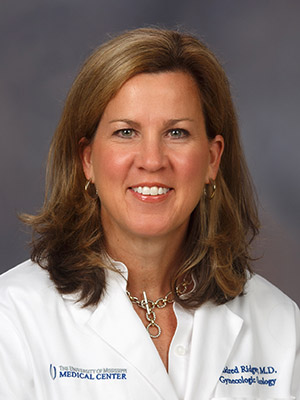
Many physicians also conduct HPV tests and Pap tests at the same time. If both are negative, the doctor will discuss how long the patient should wait before getting the next screening.
“You can get close to 100 percent efficacy with the vaccination,” said Dr. Mildred Ridgway, a UMMC associate professor of obstetrics and gynecology and a gynecologic oncologist who heads the UUMC CCRI Interdisciplinary Gynecologic Oncology Program. “Combining prevention and increasing screening would significantly lower the mortality from this cancer.”
She said parents should talk to their children’s physician or to their own physician about having the HPV vaccine administered to their children. Women 21 and older should have regular cervical cancer screenings.
Get the Hepatitis B vaccine
Hepatitis B is a liver disease caused by a virus of the same name. It can be mild or severe and it can lead to liver disease and liver cancer. The vaccine helps prevent Hepatitis B, which increases the risk of liver cancer.
Following Centers for Disease Control guidelines, the Mississippi State Department of Health recommends the Hep B vaccine be given to infants. The vaccine is also recommended for adults who have not been vaccinated.
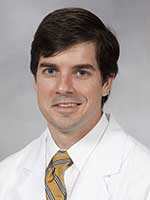
“Hepatitis B is a very strong risk factor for liver cancer and liver disease,” said Dr. Mark Earl, a UMMC associate professor of surgery and a member of the UMMC CCRI Interdisciplinary Hepatobiliary Program, a team that treats liver cancer. “Anyone with Hepatitis B should be screened for liver cancer.”
He said people at a higher risk for liver cancer can have an ultrasound every six months to screen for the cancer. Parents should talk to their children’s doctors about the vaccination schedule. Adults who haven’t been vaccinated should talk to their primary care givers.
For more information about liver and bile duct cancer, click here.
Protect your skin
Cases of melanoma, the most deadly of skin cancers, have increased as much as 3 percent each year during the last 20 years. Exposure to ultraviolet rays from the sun or from tanning beds is the primary cause.

UMMC CCRI Melanoma Cancer Program members advise individuals to limit their sun exposure and to use sunscreen, seek shade and wear sun-protective clothing if they must be outdoors.
Dr. Robert Brodell, UMMC chair of dermatology, also suggested checking your skin on the first day of every month.
“Take note of any dark or brown lesions,” Brodell said. “If one looks different than the rest, consider the possibility of melanoma. When in doubt about a lesion, see your doctor.”
Click here to learn how to screen for skin cancerand when to see a physician.
Maintain a healthy weight, limit alcohol and eat a healthy diet
Several lifestyle changes can lower the risk of multiple cancers:
• Obesity is associated with an increased risk of at least 13 cancers, including endometrial, colorectal and breast cancer in post-menopausal women. Doctors recommend striving to attain and keep a healthy body mass index of less than 25.
• The number of studies that link drinking alcohol to cancer are growing. Research already shows drinking regularly increases a person’s risk of oral, voice box and throat cancers. Other studies have linked drinking to esophageal, liver, breast and colorectal cancers.
• Following an eating plan high in fruits, vegetables and fiber and low in fat and processed meats may lower the risk for several cancers, including colorectal cancer.
• Becoming physically active also lowers the risk for many cancers.
Screening for breast, colorectal and oral cancers can lower deaths from those cancers. Screening also plays a big role in helping detect cancer early:
• Colorectal cancer: The UMMC CCRI is part of the statewide 70x2020 Colorectal Cancer Screening Initiative that encourages every eligible adult to be screened for colorectal cancer. Two primary screening options are a stool test or a colonoscopy. Those who choose colonoscopies and have polyps can usually have them removed during the screening.
If each Mississippian who is eligible for screening were screened, deaths from this cancer could be cut by more than half.
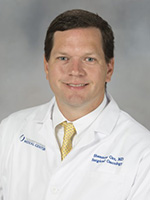
“For most patients, colon cancer could be a preventable disease,” said Dr. Shannon Orr, a UMMC associate professor of surgery who heads the Interdisciplinary Gastrointestinal Cancer Program. “With appropriate screening colonoscopies, polyps can be caught early and treated endoscopically before they become cancers.
“For those patients with cancers, they can often be cured with surgery.”
• Breast cancer: A clinical breast exam and a mammogram are the primary means of detecting breast cancer early. Women should talk to their doctors about when they should start having mammograms. Those with a family history of breast cancer may need to start screening earlier.
Women also should know their own bodies and do regular self-exams. If they notice any changes, they should see their doctors.
Multiple studies show obesity plays a role in increasing breast cancer risk in postmenopausal women, said Dr. Shawn McKinney, a UMMC associate professor of surgery and a breast surgeon in the Interdisciplinary Breast Cancer Program.
“Women should focus on both nutrition and exercise in an effort to maintain an appropriate weight,” McKinney said.
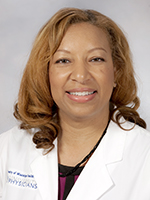
Annual mammogram screenings should be individualized, with women who are at a higher risk of breast cancer starting at an earlier age.
“Mammograms can detect disease before anything becomes clinically palpable,” she said. Earlier detection means a higher chance of survival and more treatment options.
To learn more aboutUMMC Weight Managementservices, click here. To learn more about breast cancer screenings, visit the UMMC Breast Imagingweb page. To learn more aboutcolorectal cancer screening, click here. To learn more aboutoral cancer screening, click here.
The above article appears in CONSULT, UMMC’s monthly e-newsletter sharing news about cutting-edge clinical and health science education advances and innovative biomedical research at the Medical Center and giving you tips and suggestions on how you and the people you love can live a healthier life. Click here and enter your email address to receive CONSULT free of charge. You may cancel at any time.



